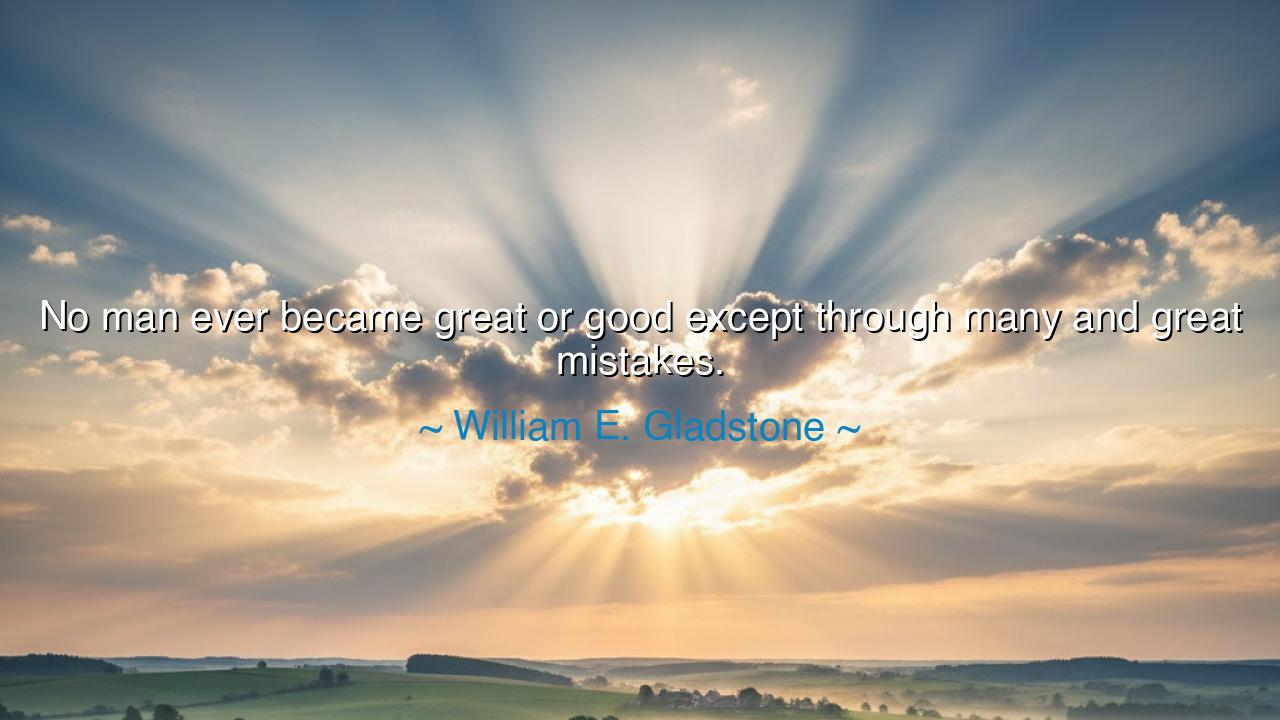
No man ever became great or good except through many and great






When William Ewart Gladstone proclaimed, “No man ever became great or good except through many and great mistakes,” he spoke with the voice of experience and the heart of wisdom. For this was no idle musing, but the confession of a man who had spent his life in the arena of power — a statesman, a reformer, a servant of the people who had learned that failure is the forge of greatness. In these words lies a timeless truth: that perfection is not the path to mastery; struggle is. That to rise high, one must first stumble deeply. For it is through error, repentance, and persistence that the human spirit is refined into strength.
Gladstone, four times Prime Minister of Britain, lived in an age of fierce transformation — a time when empires expanded, industry roared, and the world was being remade by human hands. His career was marked not by ease but by conflict — both outward and inward. He was known to change his views, to admit when he had been wrong, and to reform his beliefs in light of new truth. In this, he embodied his own saying: that greatness does not come to the unblemished, but to those who fall, rise, and learn anew. Every mistake, for him, was a step upward on the staircase of understanding.
The origin of this truth stretches far beyond politics or history — it is woven into the very nature of life. The seed must break before it becomes a tree. The child must fall before it learns to walk. The craftsman must err before his hands gain mastery. So it is with the soul of man. Mistakes are not curses but teachers in disguise, sent by Providence to humble the proud and instruct the willing. The ancient philosophers, too, knew this: Socrates taught that wisdom begins with knowing one’s ignorance; Confucius said that real knowledge is knowing the extent of what one does not know. Gladstone’s words stand in that same lineage — an echo of the eternal truth that error is the beginning of enlightenment.
Consider the story of Thomas Edison, who failed over a thousand times before bringing light to the world. When asked about his failures, he replied that he had not failed at all — he had simply found a thousand ways that would not work. That is the spirit of Gladstone’s wisdom. Each mistake, properly faced, becomes a revelation; each fall, if met with courage, becomes a step higher. The man who fears to err will never dare to act, and the man who never acts will never create. The road to greatness is paved not with perfection, but with resilience.
In every generation, there are those who fear their own imperfection — who believe that mistakes diminish them. Yet the opposite is true. To err is to live, and to rise again is to become truly human. The one who hides from failure lives in the shadow of fear; the one who faces it stands in the light of wisdom. Gladstone reminds us that the measure of a man is not in his avoidance of error, but in his response to it. The humble heart learns. The proud heart repeats. Only those who bow before their mistakes rise higher after them.
Thus, the lesson is both simple and profound: welcome your mistakes as your teachers. Let them humble, not humiliate; instruct, not imprison. When you fail, ask not “Why me?” but “What is this teaching me?” For every fall holds a hidden gift — patience, empathy, discipline, or strength. The wise do not fear these moments; they embrace them as sacred fires that purify the soul and temper the will. Greatness is not born in victory, but in the crucible of failure endured and overcome.
So, my child, remember this teaching as you walk the road of life: no man ever became great or good except through many and great mistakes. Therefore, do not dread your errors — they are the fingerprints of growth. When you stumble, rise with gratitude. When you fail, learn with resolve. When you are tested, remember that even the brightest stars are born from collapsing dust. In this truth lies the power of transformation: that by embracing our imperfection, we are shaped into something far greater — not flawless, but forged in wisdom, tempered by struggle, and worthy of the name “human.”






AAdministratorAdministrator
Welcome, honored guests. Please leave a comment, we will respond soon